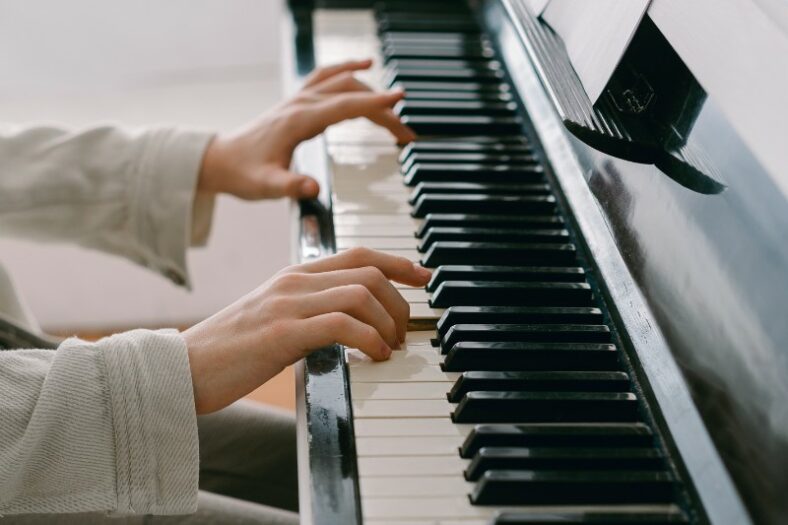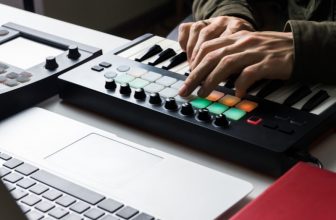10 Mistakes Beginner Pianists Make

When learning to play a new instrument, it is crucial to build a solid foundation and avoid mistakes from being engraved in muscle memory. Unfortunately, many beginner pianists make mistakes when practicing, which become harder to fix later.
From poor posture to motivational issues, there are many mistakes to watch out for and avoid when learning to play the piano. So, it is important to be aware of these common mistakes and learn to play the piano with a proper technique to have solid foundations.
Contents
1. Poor Posture
One of the most common mistakes beginner pianists make is playing with poor posture. Playing with a poor posture can cause physical pain and tension in the wrists, arms, shoulders, and neck, leading to poor technique and fatigue.
Slouching and hunching as well as sitting too high or too low, are the most common posture mistakes among beginner players. Posture is important when playing piano as it affects everything, including health, balance, performance, and technique.
These mistakes can make it more difficult to keep up with the tempo and accurately press the keys, which heavily affects the overall performance. They lead to discomfort and can create serious physical pain and injuries, especially on the back, wrists, and arms.
When playing the piano, sit up straight with your feet flat on the floor. Try to keep your arms and wrists relaxed, reducing the tension. Try to keep your hands slightly curved and elbows slightly bent.
2. Not Warming Up
Warming up before playing any instrument is crucial as it prepares your body and mind for playing. Warm-ups relax the body, improve circulation, and reduce muscle tension while increasing flexibility and coordination and sharpening the mind.
Most beginner players skip warm-ups to play songs or exercises, a big mistake that can lead to injury, fatigue, and poor technique. Not warming up can cause the muscles to tense up and get strained. As the muscles of beginner players are still developing and they are not used to the techniques of playing, it is even more important for beginner players to warm up and do the right stretches before playing piano.
Stretching the fingers, hands, and wrists before playing is a must. Also, warming up with some scale exercises, playing them half speed and full speed, playing some basic melodies before starting to play songs, or more complex exercises can get your body and mind ready to play, which would significantly improve your overall performance.
3. Having No Goals
To learn to play the piano, you need a good learning plan with solid consistency, motivation, and structure to keep you on track and motivate you to move on. A good plan with goals gives you something to strive for and a sense of accomplishment when you reach it, which is quite important in the long run.
A good plan of approach with precise goals helps you focus while allowing you to go step-by-step toward being a good pianist. Without proper goals and a plan, you can get stuck in the same difficulty level or not practice consistently, breaking the speed of your progress.
Try to create a plan and stay loyal to it while working toward your short- and long-term goals. This way, you will keep on moving on the path without getting lost.
4. Rushing During Practice
Another common mistake made by beginner piano players is being impatient and rushing during practice. To get the most out of an exercise, you should play it with the proper tempo and keep your focus on the technique and rhythm. When you rush, you make more mistakes and do not get the most out of practice.
Often beginner pianists practice their pieces too fast. But, a piece must be learned slowly and gradually in order to lock the piece to the muscle memory correctly. Playing too fast will lead to mistakes, which will be engraved in muscle memory and will be hard to change later. So, try to learn the pieces patiently, step-by-step, with a slow tempo, and build up speed later when you are comfortable with the pace.
5. Not Using A Metronome
The clicking noise of a metronome is not the sweetest sound and can be intimidating for beginner pianists. But practicing with one will help you improve your timing and rhythm, which is crucial when learning any instrument. It is the most efficient way to make progress in a short time.
Most beginner players neglect to use a metronome, which dulls their rhythmic sense and timing. Always try to use a metronome for every piece and exercise to get the timings right and prepare yourself to play with other instruments.
6. Overcomplicating Everything
When learning a new skill or piece, beginner players need to take it step-by-step and avoid overcomplicating things. When you try to learn a piece that’s too hard or try to rush yourself to advanced skills, you can learn them the wrong way and get unmotivated.
Always try to be patient and go step by step and be aware of your level. The shortest way to achieve great goals, like playing a complex piece, is to go slowly and firmly. You can get frustrated and unmotivated if you overcomplicate things, and even worse, you may build a bad technique foundation which would be harder to fix down the road.
7. Tensing Up
Another common mistake beginner pianists make is playing with tense fingers. Having the fingers flat and outstretched due to nervousness or poor technique slows the players down, making the instrument harder for them to play. The fingers should be curved and relaxed for more agility on the keyboard.
Not only the fingers but the body should be relaxed when playing the piano. Shoulders, wrists, hands, and jaw should be free from tension to move easily. Try to breathe and relax your body for better agility and control over the instrument.
8. Not Practicing Daily
Consistency is crucial for quick progression when learning to play a new instrument. While the quality of exercises is also important, having the consistency of practicing daily, even for 15 or 20 minutes, can make you progress significantly and quickly.
Most beginners do not practice every day because they don’t have time or are tired for any reason. Try to play your instrument every day, for a very short period even. This way, the frequency, and accurate repetition can become skill and muscle memory.
9. Neglecting The Pinkie Finger
Most beginner players neglect the pinkie finger and play with other fingers, which makes certain movements and musical passages harder to play. The Pinkie finger is important as it is used for many notes and chords. Not using it also can lead to tension in other fingers, which leads to poor technique.
The pinkie finger is important as it is used in many chords and complex pieces. Using it well helps you a lot when playing advanced musical pieces and to reach distant notes, which are harder to reach with other fingers. So, treat your pinkie finger as other fingers, as it is as important.
10. Losing Motivation
Learning to play a new instrument is mainly about mental dedication rather than physical exercises. Keeping the motivation to practice daily is the most important aspect when learning to play the piano. So, try to spice things up, find fun exercises, and learn pieces you like to keep you motivated.
Conclusion
Be aware of these common mistakes when learning to play the piano to reach your goals sooner and build proper technique. As the twig is bent, so is the tree inclined. So, go slowly and firmly step by step, being careful with these mistakes to reach your goals of becoming a proficient pianist and playing advanced musical pieces.





